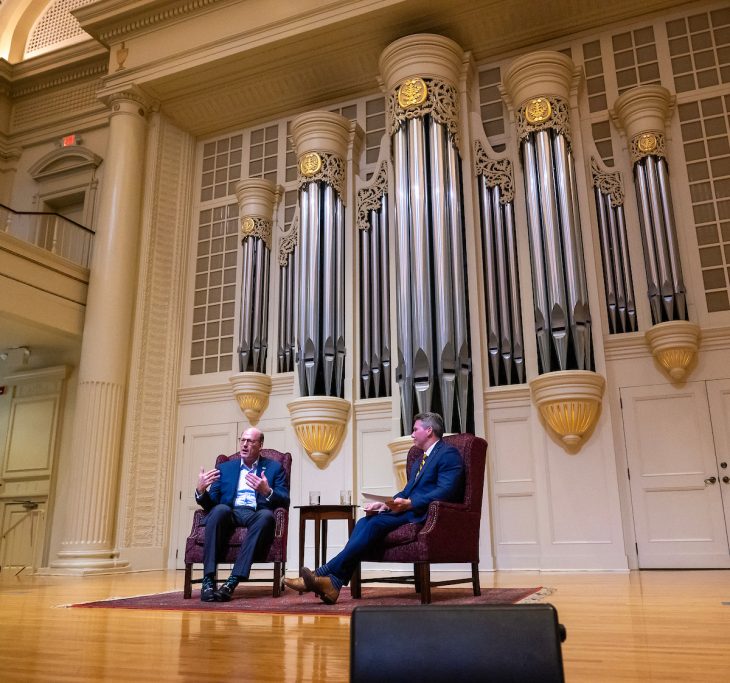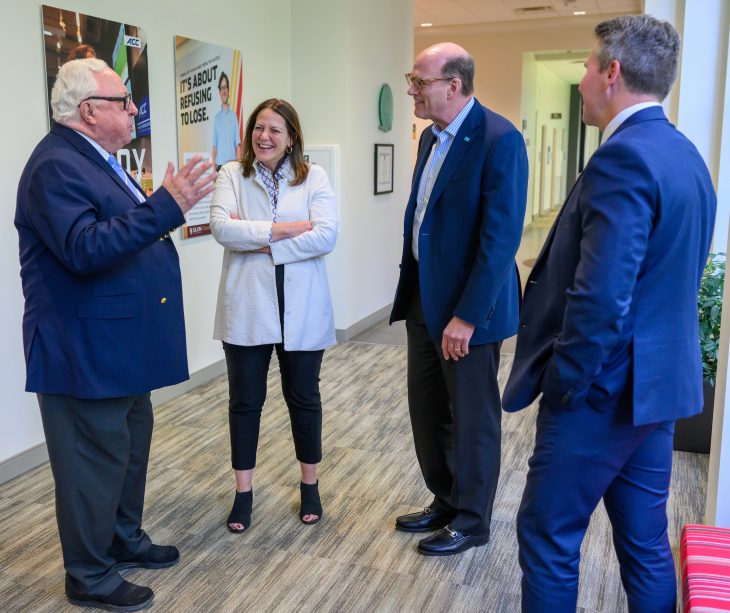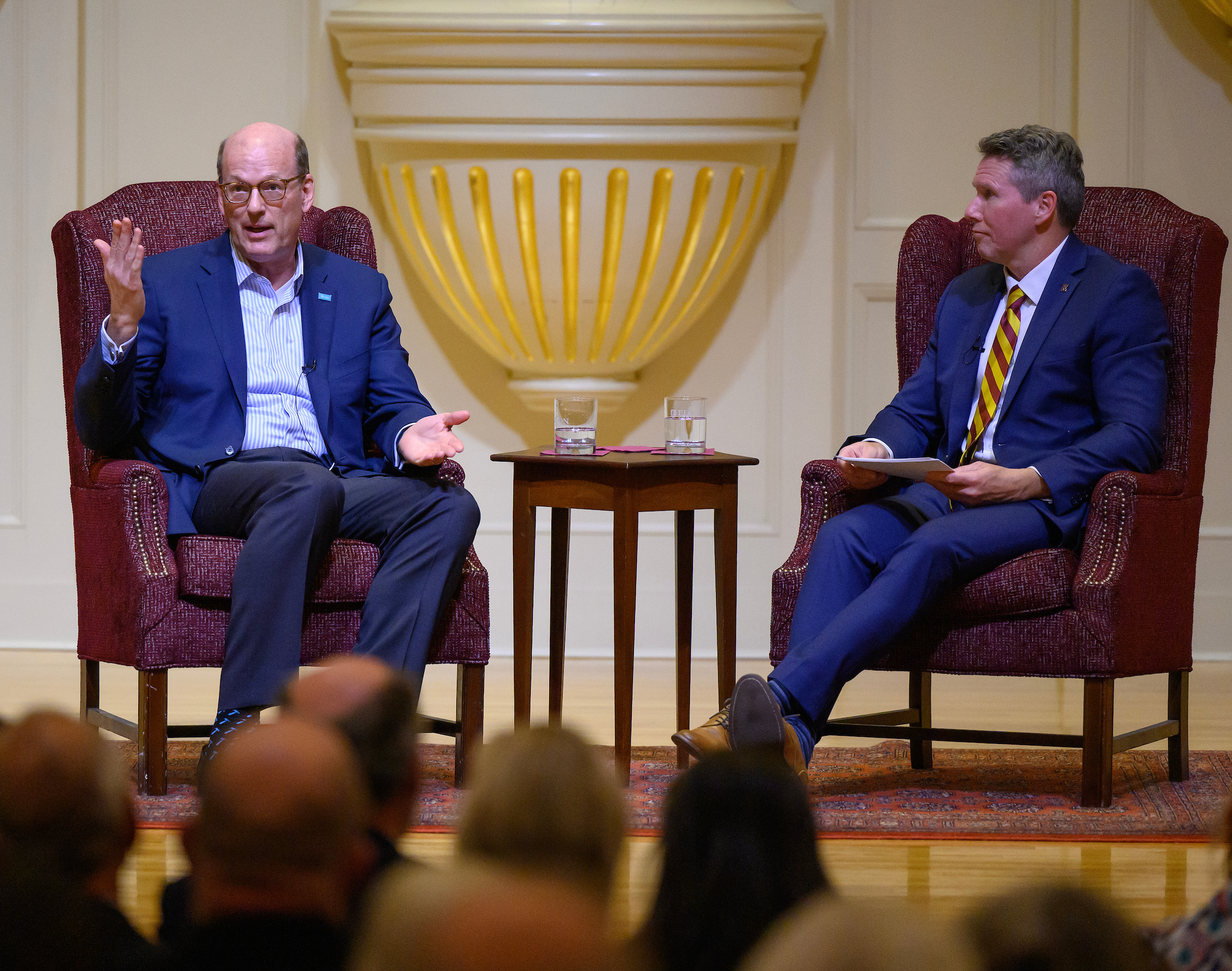Invited to deliver the James P. Elder Lecture, Jonathan Reckford shared about his professional path to leading the global affordable housing initiative and how it has impacted lives around the world.
Jonathan Reckford has crunched the numbers. As head of Habitat for Humanity International, he’s focused on how the organization can build upon its decades of work providing affordable housing solutions around the globe.
He gathered data about the pace at which Habitat can build and put new homeowners into homes, and then compared that with the global need for affordable housing. At the current pace, Habitat will be able to completely address affordable housing needs … in 1,032 years.

Reckford explained to the crowd gathered in Whitley Auditorium on Thursday, April 4, for the James P. Elder Lecture that that was a daunting calculation to make. However, it’s one that has energized Habitat to continue its work assisting low-income families through the construction and affordable financing of newly built homes while recognizing that a newly built home might not be the only solution. Habitat has expanded its focus to look at legislative barriers to property ownership in some countries where women can’t own real estate and introduce microfinancing options that can support the renovation or expansion of existing homes to provide adequate living environments to those who already own a home.
“We changed our question from ‘How many houses can we build?’ which was a really good question, but we changed it to ‘What would it take to meaningfully reduce the housing deficit in every geography we serve?'” said Reckford, who participated in a discussion with John Barnhill, associate vice president for university advancement at Elon. “That’s actually a scary question because that really forced us from being primarily a builder to thinking about how could we demonstrate God’s love by being a partner and a catalyst worldwide for safe, decent and affordable housing?”
Reckford provided an overview of how Habitat has adapted its approach and model to help answer that question during his talk to the Elon community, which is named in honor of James P. Elder, who served on the history faculty of Elon from 1963 to 1973 and served as an advisor to the Liberal Arts Forum, which he founded as an undergraduate. Thirty years after Elder left Elon for the Folger Library in Washington, D.C., a group of Liberal Arts Forum alumni established an endowed lectureship in Elder’s honor. More than 150 former students and friends have contributed to the Elder lecture series in tribute to Elder’s example of faculty-student engagement.
Reckford quickly dispelled a few misunderstandings about Habitat, which was founded in 1976. First, Habitat was not founded by former President Jimmy Carter, who has become closely associated with the Christian nonprofit following his tenure in the White House. For decades, Carter participated in annual builds for the organization and worked to promote its mission, so much so that many came to believe he founded Habitat. The organization was in fact founded by Millard and Linda Fuller.
“What is unquestionably true is that he (Jimmy Carter) put it on the map,” Reckford explained.

Another myth is that Habitat gives away houses. That’s not the model, Reckford said. Habitat is supported by volunteer labor and donations, but the houses are sold to low-income owners with the organization offering mortgages with very low interest rates. During the construction of their house, the future homeowners contribute “sweat equity” by completing a minimum number of hours of work on their own homes as well as others under construction.
“Technically, Habitat is a sub-sub-prime lender, but we have an incredibly low foreclosure rate because families have shown they can be extremely successful if they have a home they can actually afford,” Reckford explained. “Unfortunately, housing is becoming less and less affordable in the world right now, so I can’t say we’re winning. But it is because of people and communities all over the world who think we can do this that Habitat has grown into a pretty significant organization at this point.”
The global organization has now helped more than 59 million people construct, rehabilitate or preserve their homes. Since 2005, when Reckford joined Habitat as CEO, local Habitat organizations in all 50 states and in more than 70 countries have grown from serving 125,000 individuals a year to helping more than 13.4 million people last year.
And as Reckford explained, the organization has taken a broader view of addressing affordable housing needs than just building new houses. It has become active in promoting legislative changes that help secure the rights for a broader swath of the population to own property. As Reckford noted, there are many countries around the world where women and marginalized populations do not have the right to own land. For instance, Habitat backed a five-year effort in Bolivia to change federal law to allow for joint land ownership by both members of a married couple, something that had not previously been possible.
In most of the world, only about 5 percent of people have access to a mortgage, Reckford said, so Habitat started lending money to microfinance banks and teaching them how to make housing loans. Habitat is also engaged in an effort to raise $500 million for a fund that would provide loans to extremely low-income families to allow them to upgrade their homes since they are unlikely to be able to afford to build and pay for a new home. Habitat is also participating in home improvement television programming in the Phillipines and Peru to help teach people how to fix up their homes, which can scale up home improvement efforts better than sponsoring one-on-one training with homeowners.
“If we can help make the whole housing value chain work, then that starts to scale,” Reckford said. “We need to use those same principles and figure out how do we make the housing market work so we are creating enough housing for everyone in a country to have access.”



